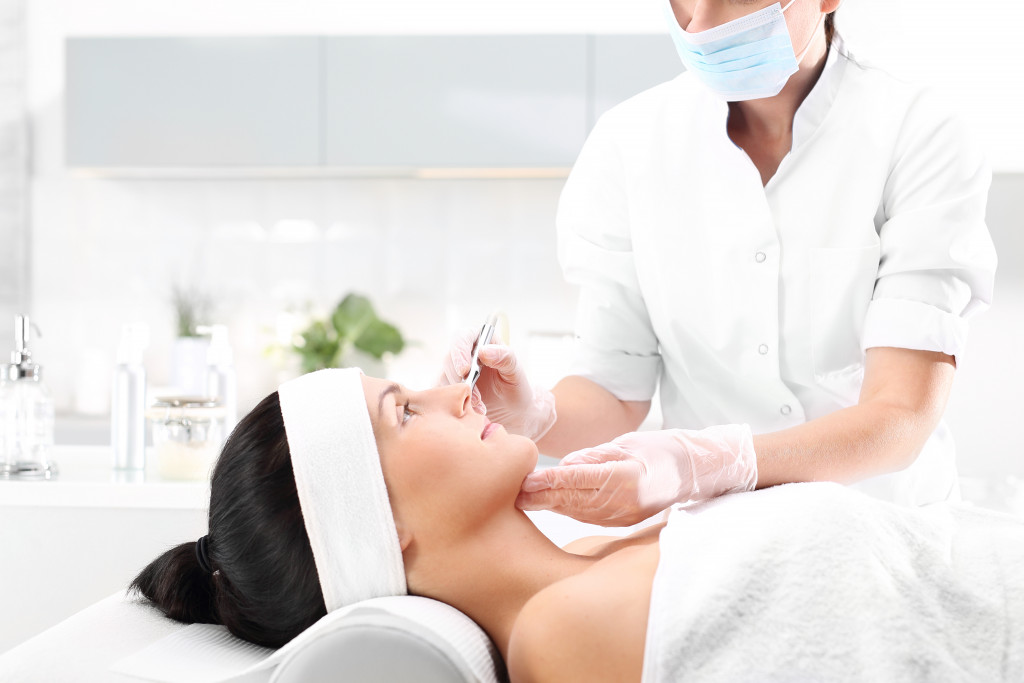- Investigating your potential surgeon’s credentials and experience is crucial in determining their competence and ensuring satisfactory results.
- Understanding the procedure’s purpose and recovery steps allows you to set realistic expectations and prepare effectively.
- Awareness of cosmetic surgery’s potential risks and complications aids in making an informed decision, with safety as a priority.
- Evaluating the costs involved is essential as cosmetic surgery is typically elective and may not be covered by insurance.
When considering cosmetic surgery, you must take several factors into account. This is a big step, and making an informed decision requires thorough research and careful thought. You’ll need to assess the qualifications and experience of your potential surgeon, understand the possible risks and complications, consider the costs, and have realistic expectations about the results. Remember, this decision is about enhancing your confidence and well-being, so it’s essential to take the time to make the right choice for you.
Choose a Reputable Dermatology Clinic
A reputable dermatology clinic is paramount in ensuring the success and safety of your cosmetic procedure. These clinics employ board-certified dermatologists, skin surgeons, and licensed aestheticians who are expertly trained in the latest advancements in cosmetic surgery.
They adhere to strict hygiene and safety standards and employ state-of-the-art equipment to ensure precision and minimal risk during procedures. Furthermore, they provide comprehensive consultations, enabling you to understand the procedure, potential outcomes, and risks.
Choosing a reputable dermatology clinic is not merely a matter of achieving the desired aesthetics, it’s also about ensuring your health and safety. Therefore, verifying the clinic’s certifications, checking patient reviews, and meeting the team before deciding are important.
Do Your Research
To ensure your cosmetic surgery yields the best results and meets your expectations, you must thoroughly research the procedure, potential outcomes, and the surgeon’s expertise. Here are some tips:
Research on Surgeon’s Credentials
When choosing a surgeon, pay meticulous attention to their credentials. Ensure they are board-certified in dermatology or plastic surgery, as this certification demonstrates their proficiency, education, and training in the field. Examine their experience, specifically in the procedure you’re considering.
Look for patient reviews and before-and-after photos to assess their skills. Also, it’s paramount that the surgeon has hospital privileges, even if the procedure isn’t being performed within a hospital. This indicates that the surgeon has passed the hospital’s thorough review of their credentials.
Lastly, consider the surgeon’s demeanor and professionalism. They should make you feel comfortable, answer your questions clearly, and show respect for your decisions. Remember, the success of cosmetic surgery largely depends on the surgeon’s skill and expertise, making this research a vital step in the process.
Assess Surgeon’s Experience
The surgeon’s experience is a crucial consideration when planning for cosmetic surgery. Experienced surgeons deeply understand the intricate procedures and have honed their skills through years of practice. They are equipped to handle complex cases and unexpected challenges, minimizing potential risks and complications.
It’s essential to ask how often they’ve performed the specific procedure you’re considering. A surgeon with considerable experience in your desired procedure will be able to provide you with a realistic view of potential outcomes and guide you effectively through the recovery process.
Moreover, an experienced surgeon has a wealth of before-and-after photos that can give you a clear idea of their work and the results you can expect. Experience breeds proficiency and consistency, which is pivotal in cosmetic surgery.
Understand the Procedure

Understanding the procedure you plan is crucial to preparing for cosmetic surgery. Spend time researching the specifics of the operation, its purpose, and the techniques involved. This knowledge will help you form realistic expectations about the results. Also, familiarize yourself with the steps of the recovery process and any potential complications that may arise.
Knowing what to expect post-surgery will help you mentally and physically prepare, ensuring a smoother recovery period. Understanding the terminology your surgeon may use during consultations is also beneficial. This will enable you to communicate more effectively with your surgeon, allowing you to voice any concerns or ask pertinent questions.
Your preparation should give you the knowledge necessary to make informed decisions about your surgery, which is key to achieving your desired outcomes. Remember, understanding is power when it comes to your health and well-being.
Acknowledge Risks and Complications
Like any surgical procedure, cosmetic surgery has inherent risks and potential complications. It’s vital to be aware of these before making your final decision. Risks can range from minor inconveniences like bruising or swelling to more serious complications such as infection, scarring, or even anesthesia reactions.
Certain procedures may also carry unique risks; for instance, implants might shift, leading to asymmetry, or rhinoplasty may result in breathing difficulties. It’s also important to understand that individual factors like overall health, lifestyle habits (like smoking), and how well you follow pre and post-operative care instructions can significantly impact your risks and the outcome of the surgery. Always discuss these risks with your surgeon, and weigh them heavily in your decision-making process. Your health and safety should always be the primary concern.
Evaluate Costs

Cosmetic surgery is often considered an elective procedure, meaning it might not be covered by insurance. Therefore, it’s crucial to evaluate the costs involved. These can vary widely depending on the specific procedure, the surgeon’s expertise, the geographic location, and the need for additional surgeries or follow-up care. Costs may include surgeon’s fees, anesthesia fees, hospital or surgical facility costs, medical tests, medication, and post-surgery garments.
When considering the cost, remember it’s not an area to cut corners. Choosing a less experienced surgeon or a less reputable clinic to save money can result in unsatisfactory results or even complications that can cost more in the long run. Therefore, consider cosmetic surgery an investment in yourself and choose wisely. Many clinics offer financing options to assist patients. Make sure to ask about these during your consultations.
In conclusion, making an informed choice about cosmetic surgery involves thorough research, careful consideration, and a commitment to your well-being. Take the time to choose a reputable clinic, understand the procedure, acknowledge risks, and evaluate costs. It’s your journey to enhanced confidence and well-being, so decide wisely.






